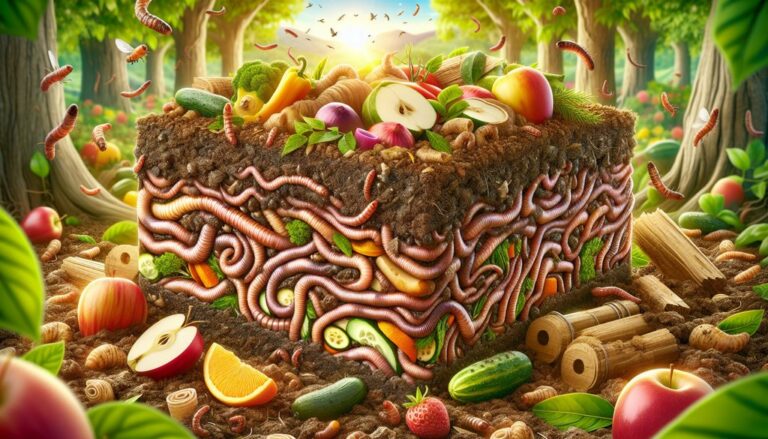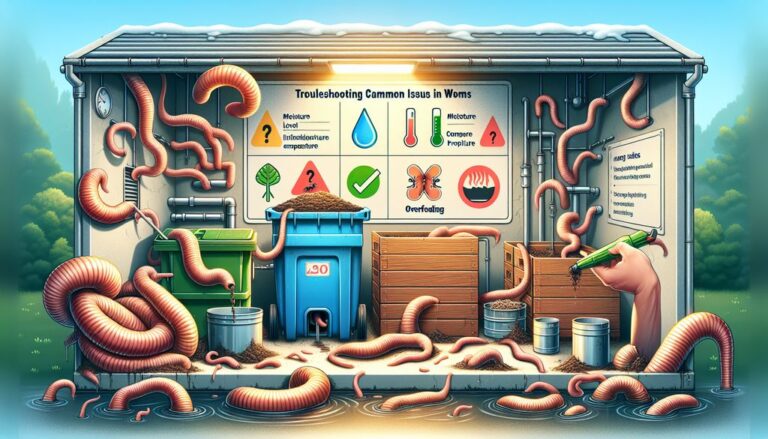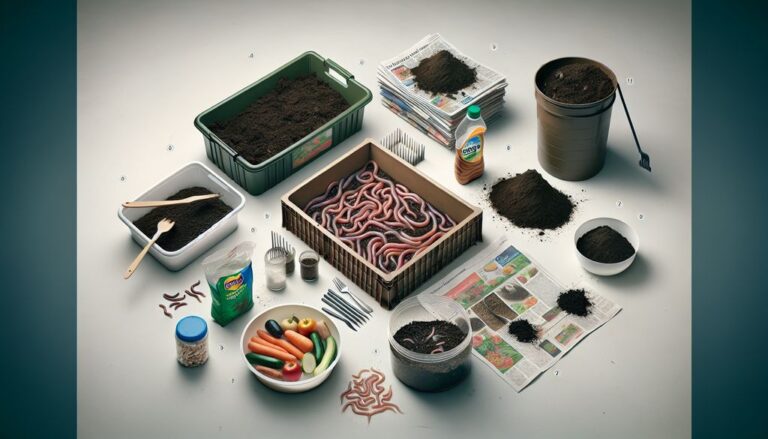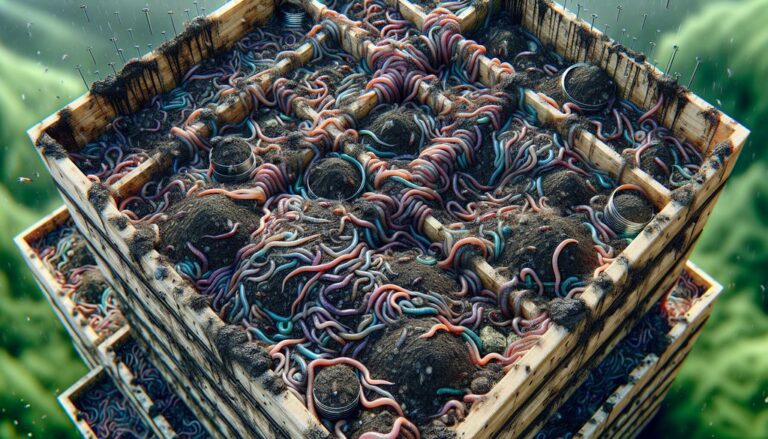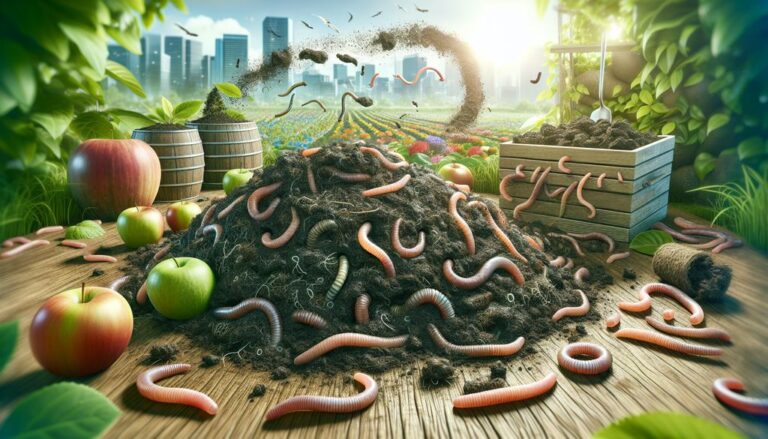Apartment dwellers and urbanites often face challenges when it comes to composting due to limited space and outdoor restrictions. However, vermicomposting, also known as worm composting, offers a practical solution for those living in small spaces. This method utilizes special composting worms to break down organic waste quickly, making it ideal for urban dwellers. In this article, we will explore the key takeaways for implementing vermicomposting in small spaces and provide valuable tips for apartment dwellers.
Key Takeaways
- Vermicomposting is an ideal composting method for apartment dwellers and urbanites
- Balancing organic waste with a ratio of 2 parts browns to 1 part greens is crucial for successful vermicomposting
- Wormeries produce compost much quicker than traditional compost bins, often within a few months
- Vermicompost is considered to be of superior quality compared to traditional compost, containing higher levels of nutrients and beneficial microorganisms
- Indoor compost bins and compact wormeries are excellent alternatives for apartment dwellers with limited outdoor space
Vermiculture in Small Spaces: Tips for Apartment Dwellers
Understanding Vermicomposting
Vermicomposting is a process that transforms organic waste into nutrient-rich fertilizer using the natural digestion of worms. It’s an ideal solution for apartment dwellers or those with limited outdoor space. Worm castings, the byproduct of vermicomposting, are a potent natural fertilizer that can greatly benefit garden plants.
To start vermicomposting, you’ll need a worm bin, which is a container that provides a dark and ventilated environment for the worms. Common bedding materials include shredded newspaper, cardboard, or coconut coir, which should be kept as moist as a damp sponge. Red worms, such as Eisenia fetida or Lumbricus rubellus, are typically used and can be purchased from reputable sources.
Vermicomposting not only recycles kitchen waste but also produces a high-quality compost that is rich in nutrients and beneficial microorganisms.
Here are some benefits of vermicomposting:
- High-Quality Compost: Vermicompost is richer in nutrients compared to traditional compost.
- Minimal Odor: Worm bins produce very little odor, making them suitable for indoor use.
- Space Efficient: Worm bins can be kept in small spaces, such as under the kitchen sink or on a balcony.
However, it’s important to note that wormeries require careful maintenance and can only process a certain amount of waste, making them less suitable for large quantities of organic matter.
Choosing the Right Method
Selecting the right composting method is essential for successful vermiculture, especially in small spaces. Consider your available space, time commitment, and the type of organic waste you’ll be dealing with. For apartment dwellers, vermicomposting is often the most practical choice, as it requires minimal space and can be done indoors.
Here are some factors to consider when choosing your composting method:
- Space: Vermicomposting bins can fit under a sink or in a closet.
- Time: Vermicomposting requires less maintenance than traditional composting.
- Waste: Worms in vermicomposting systems thrive on kitchen scraps.
Once you’ve selected a method, ensure you have the right setup to provide an optimal environment for the composting process. This includes a well-ventilated space with controlled moisture levels to prevent odors and promote efficient breakdown of organic material.
Remember, the goal is to create a sustainable system that fits your lifestyle. Whether you choose a simple bin or a more sophisticated system, the right approach can make vermiculture a rewarding part of your daily routine.
Balancing Organic Waste
Balancing organic waste is a pivotal aspect of vermiculture, especially in small spaces. Achieving the right balance between ‘browns’ and ‘greens’ is crucial for successful composting. Browns, such as dry leaves, straw, and paper, provide carbon, while greens, including fruit and vegetable scraps, coffee grounds, and grass clippings, supply nitrogen. A general guideline is to aim for a ratio of roughly 2 parts browns to 1 part greens by volume. This helps create the ideal conditions for efficient decomposition without unpleasant odors or slow breakdown.
To maintain a healthy vermiculture system, it’s important to add a diverse array of organic waste. This ensures that the composting process proceeds efficiently, yielding nutrient-rich compost.
Here are some tips to balance your organic waste effectively:
- Collect kitchen scraps such as fruit and vegetable peels, coffee grounds, and tea bags. Avoid meat, dairy, and oily foods to minimize odors and pests.
- Chop or shred your organic waste to speed up the decomposition process.
- Layer your waste by alternating between greens and browns to maintain the ideal carbon-to-nitrogen ratio.
- Monitor moisture levels; your compost should be damp but not soggy. Adjust by adding more browns if it’s too wet or greens if it’s too dry.
- Turn your compost regularly to aerate it and speed up the composting process.
By following these simple steps, you can ensure a thriving vermiculture system even in the smallest of spaces.
Benefits of Vermicomposting
Vermicomposting offers a plethora of advantages, especially for those living in apartments or with limited outdoor space. High-quality vermicompost is one of the most significant benefits; it’s rich in nutrients and beneficial microorganisms, making it an excellent amendment for plants. Unlike traditional composting methods, vermicomposting is faster, often yielding usable compost within a few months.
Another advantage is the minimal odor produced by wormeries. The controlled environment and absence of odorous decomposition processes make it a neighbor-friendly option in close living quarters. Additionally, vermicomposting systems are compact and manageable, fitting neatly into small spaces.
Vermicomposting transforms your kitchen scraps into a valuable resource for your plants, promoting a sustainable cycle within your home.
Here’s a quick list of the benefits:
- Speedy composting cycle
- Superior quality of compost
- Low odor emissions
- Space-efficient design
- Encourages sustainable living practices
Conclusion
In conclusion, vermiculture is an excellent composting method for apartment dwellers and urbanites with limited space. It provides a controlled environment for decomposition and requires minimal maintenance. Vermicomposting, utilizing special composting worms, such as red wigglers, offers a quick breakdown of organic waste, making it ideal for small indoor or outdoor spaces. Additionally, Bokashi composting is recommended for composting meat, dairy, and citrus waste. By balancing greens and browns and utilizing compact vermicomposting systems, apartment dwellers can easily incorporate composting into their sustainable living practices. Composting in small spaces is not only feasible but also highly beneficial for the environment and gardening endeavors.
Frequently Asked Questions
Can I compost in my apartment?
Yes, you can compost in your apartment using methods like vermicomposting or indoor composting systems designed for small spaces.
What is the best method for composting meat, dairy, and citrus waste?
Bokashi is the best method for composting meat, dairy, and citrus waste, as these food items don’t work well with other composting methods.
How do I balance greens and browns in vermicomposting?
Aim for a balanced ratio of roughly 2 parts browns to 1 part greens by volume to create the ideal environment for vermicomposting.
Where can I get worms for vermicomposting?
You can get worms for vermicomposting by purchasing them from a supplier or by finding local worms in a damp area of your garden.
What are the benefits of vermicomposting?
The benefits of vermicomposting include faster composting, high-quality vermicompost, less odor, and compact and space-efficient composting systems.
What are the options for composting in small spaces or urban areas?
Options for composting in small spaces or urban areas include vermicomposting, indoor composting systems, and compact compost bins designed to minimize odors and pests.

